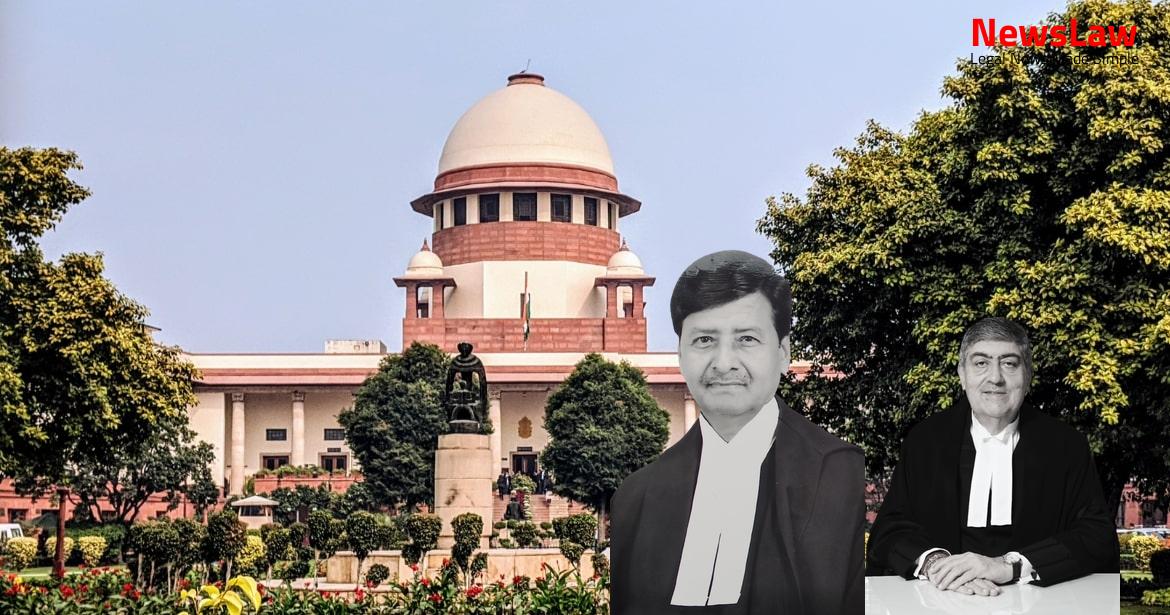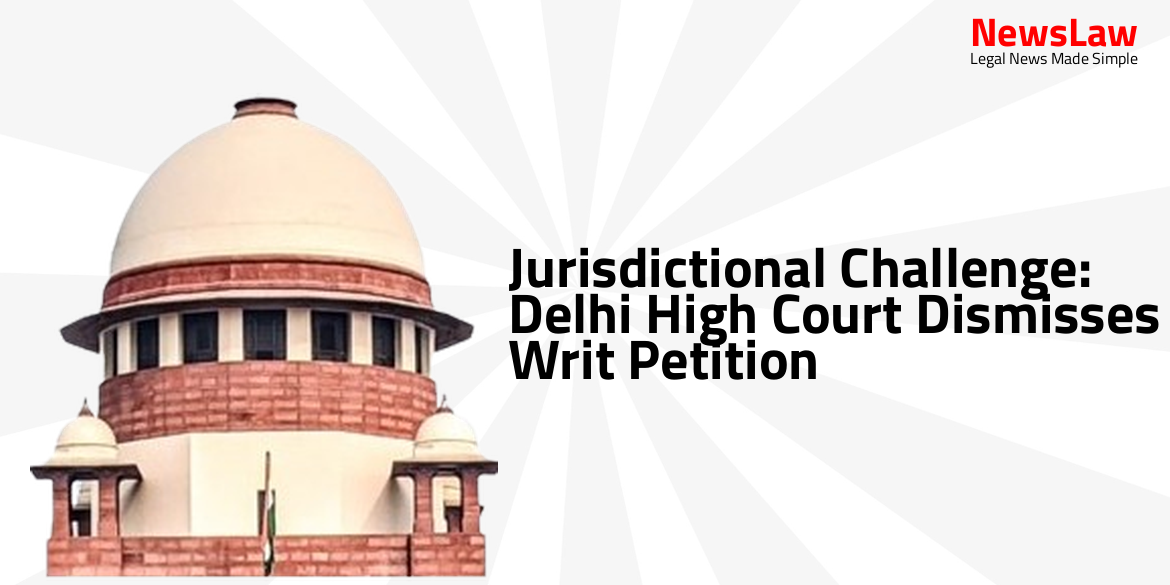A significant decision by the Supreme Court of India has been made regarding the legal relationship in chit fund schemes. The case analyzes the jural relationship established by the chitty agreement in a dispute involving a chit fund entity in which the rights and obligations of the subscribers were under scrutiny. This judgement will have far-reaching implications on the functioning of chit funds and the legal obligations of the parties involved.
Facts
- Appellant – Company filed two suits against the subscribers for non-payment of chit fund installments.
- The chit fund duration was from 1978 to 1990, and the respondents were subscribers.
- The first suit (O.S. No 323/1984) was for recovery of installments from 1981 to 1984, and the second suit (O.S. No 548/1987) was for future subscriptions post-1984.
- The court decreed both suits in favor of the Appellant – Company in April 1990.
- The nature of transactions under a chit fund is that of a debtor-creditor relationship, ensuring every subscriber receives the prize amount.
- The chit fund institution combines savings and borrowings amongst subscribers, with the foreman charging a commission for services.
- The subscribers were directed to pay specific amounts with interest as per the court orders.
- Chit fund is an indigenous financial institution involving periodic subscriptions by a group of individuals.
- Appellant chit fund company filed a Special Leave Petition against the Division Bench judgment.
- The Division Bench allowed one appeal and dismissed the other based on the Janardhana Mallan case.
- The Janardhana Mallan case held that future installments cannot be recovered by the chit fund company.
- The Appellant was allowed to recover 12 installments but not future installments.
- The Single Judge had previously dismissed appeals stating that the Kerala Chitties Act, 1975 does not apply.
- The chitty agreement does not create an immediate debt for all future installments, only a promise to pay.
Issue
- The issue in this Civil Appeal pertains to the legal relationship between a chit fund entity and the subscribers as outlined in the chitty agreement.
- Central to the matter is determining whether the relationship constitutes a debt in prasenti or a promise to fulfill a contractual obligation.
- The Appeal originates from a chit fund scheme operated by the Appellant.
- The court will analyze the nature of the jural relationship established by the chitty agreement in this case.
- The decision will have implications on the rights and obligations of both the chit fund entity and the subscribers involved.
Also Read: CRPF Act: Validity of Rule 27 for Compulsory Retirement – Case of Head Constable vs. CRPF
Analysis
- The division bench in the impugned Judgment held that entering into a chitty agreement does not create a debt at once by the subscriber for the future installments.
- The constitutional validity of the Chit Funds Act, 1982 was challenged in Shriram Chits & Investment (P.) Ltd. v. Union of India & Ors.
- The Chit Funds Act, 1982 contains provisions to protect the interests of subscribers.
- A prized subscriber in a chit fund transaction is granted a loan from the common fund by the foreman, with the facility of repayment in installments.
- The Kerala High Court held in P.K. Achutan case that a prized subscriber becomes a debtor for the amount paid to him and it is not considered penal in nature.
- In Janardhana Mallan case, the Kerala High Court overruled the decision in P.K. Achutan, stating that entering into a chitty agreement does not create a debt for the future installments.
- The Constitution Bench held that stringent provisions in the agreement are justified to safeguard the interests of subscribers and the foreman.
- The Central Act of Chit Funds became applicable in Kerala, implying the repeal of the Kerala Chitties Act, 1975.
- The relationship between foreman and subscribers in a chit fund transaction justifies stringent provisions for safeguarding interests.
- The Chitty variola embodies a promise to pay on future dates.
- Contract providing for payment in installments, with a stipulation that on default all future installments become payable, was not considered penal in nature.
- Prized subscribers in a chit fund scheme must pay subscriptions regularly as per the agreement.
- If a prized subscriber defaults, the foreman can recover the consolidated amount of all future subscriptions from the defaulter.
- The Chits Funds Act, 1982 clarifies that chit fund transactions are not moneylending transactions.
- Empowering the foreman to recover the entire balance in case of default is essential for the chit fund system to function effectively.
- Such provisions are not considered penalties but are necessary to ensure punctual payments and the smooth functioning of the chit fund.
- The stipulation of recovering the entire balance in case of default is not unconscionable in the context of chit fund transactions.
- Chit subscribers incur a debt payable in installments at the time of subscription.
- Foreman must demand future subscriptions by written notice before claiming a consolidated payment from a defaulting prized subscriber.
- Any property obtained as security for the consolidated payment of future subscriptions shall remain as security for the due payment of future subscriptions.
- The purpose is to empower the foreman to recover the amount in a lump sum from defaulting subscribers to protect the interests of other subscribers and ensure the smooth functioning of the Chit Fund.
- If a dispute is raised by a foreman for a consolidated payment of future subscriptions from a defaulting prized subscriber, the subscriber can pay the arrears with interest and costs to avoid further legal action.
- Foremen must deposit all consolidated payments of future subscriptions in an approved bank mentioned in the chit agreement before the date of the succeeding installment.
- Prized subscribers must furnish security for the due payment of all future subscriptions, or offer to deduct the amount from the prize amount due to them.
- The relationship between a chit subscriber and the chit foreman is a contractual obligation
- This relationship creates a debt on the day of subscription
Also Read: DAMEPL vs. DMRC: Curative Petition and Arbitral Award Restoration
Decision
- The Civil Appeal is allowed in the aforesaid terms.
- All pending Applications, if any, are accordingly disposed of.
- The impugned judgment dated 15.01.2009 passed by the Division Bench of the High Court in AFA No 85 of 1994 is set aside.
- On default taking place, the foreman is entitled to recover the consolidated amount of future subscriptions from the defaulting subscriber in a lump sum.
- Ordered accordingly.
Case Title: M/S. ORIENTAL KURIES LTD. REP. BY ITS CHAIRMAN P. D. JOSE Vs. LISSA
Case Number: C.A. No.-005401-005401 / 2009



